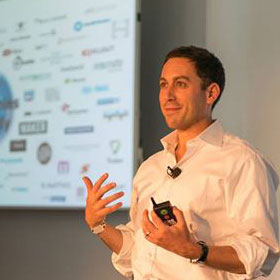The Unicorn Effect
Posted on .[Title borrowed from Aileen Lee’s essay “Welcome to the Unicorn Club.” It is worth a read.]
[Editors Note: I don’t know the guy in this photo.]
This past February we flew the entire Greycroft team to Utah for a ski weekend, which doubled as our firm-wide offsite. In addition to the usual stuff, every partner had a chance to lead a discussion on a topic of his or her choice. I picked a review of “Thinking, Fast and Slow” by Daniel Kahneman.
My goal was to help the firm identify decision-making bias. My theory is that investors often focus on recent outcomes, which anchor us to an unrealistic notion of exit value. I have circumstantial evidence that other VCs do this, but I mostly find myself falling into this trap all the time.
This subject is top of mind because in the past few weeks we have passed on, as well as outright lost, a number of competitive investments based on valuation. It is not the first time we have gone through a spell like this, and it won’t be the last.
In my experience VC valuations generally fall within a close range – firms have the same information and we underwrite investments with similar return targets – until something changes in the market and valuations suddenly rise or fall. We are in a phase right now where other firms have bid 200-300% higher than our proposals. The only conclusion is that other investors have expectations that are very different from our expectations.
I am sure we are not alone.
In the past 24 hours both Fred Wilson and Aileen Lee have written blogs about the number of billion dollar outcomes, so big deals are top of mind. If you read their posts you may even think that there are a lot of billion dollar outcomes out there. This is the unicorn effect: just because someone once saw a unicorn doesn’t mean that you will see one too. If Aileen’s figures are correct, an early stage investor who makes 2 to 3 investments a year could invest for 400 years and still have less than a 50% chance of funding a single billion dollar outcome.
I also looked at the most recent data from my friends at CB Insights and PWC, and, in spite of the strong IPO market, the mean and median outcomes for venture-backed companies have not changed much year over year. Based on their data, the median venture-backed outcome is still hovering around $55MM. This number excludes both write-offs and companies that were acquired without a disclosed purchase price. If you were to include those investments you would have a median outcome of zero, because fewer than 50% of VC-backed companies reach a successful exit. On a similar “upside-only” analysis, the mean outcome is around $120MM.
Whenever we lose an investment on valuation I can’t help but think to myself that maybe the other guy is right. Maybe we have missed the next Facebook or Google. On the other hand, maybe a better strategy is to sit out a hand or two and see what the future brings. Time will tell.

Ian Sigalow
http://sigalow.comIan is a co-founder and partner at Greycroft Partners in New York City. He has been a venture capitalist since 2001.

AUTHOR kswan
Posted on 6:59 pm November 4, 2013.
I can really appreciate this, Ian. In my career, only 6 years in, I have already passed on two opportunities (seed round) that have become billion dollar companies. That hurts. However, if put in those positions again I would make the same decision based on what I knew then.
Sharing these stories with a mentor he said two things I will not forget. First he asked me if I want to be ‘lucky’ or ‘good’. A young guy hitting a couple of billion dollar companies right of the bat would likely be chalked up to ‘lucky.’ Second, he said the important thing was that I was in the right place at the right time and to make sure to work hard to find yourself in those positions even more often going forward.
It is a real challenge to not get caught acting out of FOMO (Fear Of Missing Out). However, the best investors seem to stick to their thesis and are disciplined when it comes to valuations, etc. We have been in a period of extremely bullish times and it is foolish to think it will continue. You have to be driven by your convictions and you have to put effort in to develop those convictions.
Beyond that, you nailed it – time will tell. I often get asked how things are going with our funds and I always answer the same way – ask me in 10 years. 🙂